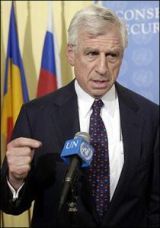US faces opposition to resolution threatening sanctions against Sudan
By EDITH M. LEDERER, Associated Press Writer
UNITED NATIONS, Sep 16, 2004 (AP) — The United States faced opposition from China, Russia and other Security Council members to its latest draft resolution threatening oil sanctions against Sudan if the government doesn’t quickly rein in militias blamed for atrocities in western Darfur.
 The resolution was the only subject discussed at the council’s monthly luncheon Wednesday with Secretary-General Kofi Annan. Diplomats said there were deep divisions among the 15 members on how to pressure the Sudanese government to end the conflict that has killed over 50,000 people and forced more than 1.2 million to flee their homes.
The resolution was the only subject discussed at the council’s monthly luncheon Wednesday with Secretary-General Kofi Annan. Diplomats said there were deep divisions among the 15 members on how to pressure the Sudanese government to end the conflict that has killed over 50,000 people and forced more than 1.2 million to flee their homes.
Washington has called the conflict “genocide” and the U.N. humanitarian chief, Jan Egeland, in April called it ethnic cleansing and one of the world’s “worst humanitarian crises.”
The United States circulated a revised draft Tuesday that softened language in the original text but still threatened to consider sanctions, including against Sudan’s petroleum sector. Sudan began exporting oil in 1999 and produces an estimated 250,000 barrels per day.
At least five council members — China and Russia which have veto power, and Pakistan, Algeria and Angola — also had problems with other parts of the new draft.
The concerns include its declaration of “grave concern” that the Sudanese government “has failed to comply fully” with its previous commitments to curb the militias and provide security for the civilians who fled; its call for an independent commission to investigate “whether or not acts of genocide have occurred;” and its call for a halt to all military flights over Darfur.
Council experts met Wednesday afternoon and members were expected to hold closed-door consultations on Thursday. U.S. deputy ambassador Stuart Holliday said the United Nations was looking for a vote on Friday.
China’s U.N. Ambassador Wang Guangya, who threatened to veto the original draft, told two reporters on Wednesday that the changes in the new draft “are more cosmetic … there’s no change in the substance.”
“Politically speaking, it is difficult for my government to approve this resolution,” he said.
When asked if China would veto this draft as well, Wang said, “I don’t know. I need to ask for instructions from my government.”
He said the resolution should take a “constructive” approach to find a solution to the crisis, not a “destructive” approach. It should call on the Sudanese government to cooperate with the United Nations and with the African Union which plans to deploy a larger monitoring force to Darfur and urge countries to provide more humanitarian assistance.
Russia’s U.N. Ambassador Andrey Denisov said Moscow hopes the current draft will be amended again to address the concerns of a number of council members.
Asked whether the possibility of oil sanctions was acceptable, he said “we don’t like it … those sanctions and specifically mentioning oil.” Denisov wouldn’t comment on a possible veto.
Algeria’s U.N. Ambassador Abdallah Baali said his country does not believe “it is accurate and fair” to say that Sudan has not fulfilled its commitments, and therefore it doesn’t believe any consideration of sanctions is appropriate.
Algeria doesn’t support an international commission to investigate possible genocide “because the African Union had already, at its Addis Ababa summit in July, determined that there was no genocide and no ethnic cleansing,” he said.
Pakistan’s U.N. Ambassador Munir Akram said Secretary-General Kofi Annan’s report on Sudan’s compliance was mixed and the threat of sanctions is “premature at best.”
“I think we have to give them a chance to implement _ pressure certainly, but not extreme pressure,” he said.
Akram warned that the threat of sanctions could provoke a decision by the Sudanese government not to cooperate with U.N. and African Union efforts to end the Darfur crisis.
“What will the international community do after that? Will it send in a force of 50,000 people? Is it capable of doing it? It’s not. So let’s not call out empty threats that could cause lots of people to die,” he said.
But Germany’s U.N. Ambassador Gunter Pleuger strongly supported the U.S. draft saying his government wants a resolution with “sharp teeth” in order to stop the killing.
